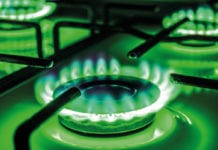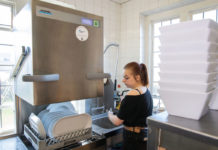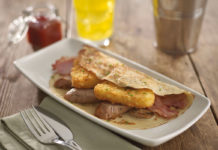Operators can get ahead of the game by preparing early, firms say
THERE’S still a few weeks of summer – and the chance of some more decent weather – left.
But for many in the trade, attention has already turned to the festive season, with many operators taking bookings for Christmas lunches and office nights out.

The festive focus means more than just finalising the Christmas menu, however.
Ensuring kitchen equipment is up to the mark for what will be a busy spell is vital – and equipment manufacturers and suppliers say now is the time to check kit is capable.
Steve Elliott, national sales manager for Valentine Equipment and Cuisinequip, said that before “especially hectic trading periods” like the festive season it is “wise to check that key equipment is operating at maximum efficiency”.
“We would say that it is really important to monitor and assess your key pieces of kitchen equipment on an ongoing basis – that’s things like prime cooking, fryers, induction, refrigeration and freezing, etc.” he said.
Keep in mind staff numbers and skill level.
“A head chef or senior kitchen staff should be looking at how key equipment is performing on a daily basis and considering each week if improvements can be made in daily operation, cleaning and maintenance.”
John Wannan of Moffat Catering Equipment agreed that operators should check over and service equipment ahead of the festive period.
“Regular servicing is extremely important in order to protect the investment and prolong the life of the catering equipment,” said Wannan.
“Check with your supplier what after-sales and maintenance programme they have on offer.
“If you choose a British brand you can be sure of ready availability of spares and service personnel.”
The Moffat Catering Equipment sales and marketing manager added that to ensure equipment is working to optimum efficiency “staff should always follow the manufacturer’s guidelines”.
 Following guidelines should lead to a longer lifespan for kitchen equipment, according to Simon Aspin of Hubbard Systems, which distributes the Scotsman range of ice machines.
Following guidelines should lead to a longer lifespan for kitchen equipment, according to Simon Aspin of Hubbard Systems, which distributes the Scotsman range of ice machines.
“The better any piece of equipment is looked after the longer it will last,” he said.
However, no matter how well equipment is looked after, it will need to be replaced one day, and Aspin said there are a number of factors operators should consider when making a purchase.
“When choosing your icemaker check with your supplier what after-sales service is available and always fit a filter and make sure you or your service company changes it at regular intervals,” said Aspin.
Ensuring all equipment is capable of handling an increased number of covers is essential, according to Nick Pendelbury of Pantheon Catering Equipment.
Pendelbury suggested that Christmas “is not the time to take risks”, and said it’s “worthwhile checking that you have all the equipment you need to service your menu across the anticipated rise in covers”.
Doing this ahead of time could avoid problems down the line as Shaune Hall of Falcon Foodservice Equipment reckons “impulsive replacement” of kitchen equipment “is not recommended”.
“Caterers should take time in advance to determine their exact needs, what equipment and models are available, and decide on those most suitable to meet the requirements of their kitchen,” said Hall.
“A key consideration is the number of covers.
“However, caterers should also keep in mind how many staff they have and their skill level.
“Will the physical kitchen size and capabilities of the staff be able to deliver the menu?”
If operators want to make the most of the space they have, Graham Killie of Frima UK suggests picking up multi-functional equipment as a way of streamlining the kitchen.
“The latest multi-functional cooking equipment is a kitchen must-have,” he said.
“The advantage of multi-functional equipment is that it doesn’t stand idle.
“It relieves the pressure on space in pub kitchens, as one piece of equipment can do the job of several separate items.”
Using multi-functional equipment also offers businesses a “chance to be greener”, Killie reckons, through a smaller kitchen footprint and savings on extraction systems and overall running costs.
“Traditional and older equipment is often less energy efficient so caterers should look at how much their existing equipment is costing them to run,” he said.
Multi-functional equipment can save space.
Efficiency is the name of the game when it comes to keeping things cool, Malcolm Harling of Williams Refrigeration said.
“Refrigeration operates 24 hours a day so choosing models that use energy-saving technology makes sense – both financially and in terms of environmentally-friendly practice,” said Harling.
Although efficiency is key, Harling added that there’s “no point in buying a model that uses less energy but can’t keep the ingredients at the right temperature”, and so it’s vital operators ask their supplier to confirm a refrigerator’s performance levels.
Finding equipment that’s fit for purpose was also highlighted as crucial by Mark Hogan of Foodservice Equipment Marketing (FEM), who suggested the rigour of a commercial environment puts reliability at a premium.
“With kitchens using the same equipment for several menu items all day long the emphasis is on reliable, long-lasting and hard-wearing appliances,” said Hogan.
“There is an increased pressure on many restaurants to shrink the kitchen space in order to create more room for customers.
“Caterers need equipment that makes the most of the space available.”
Robert Campbell of QED also highlighted the footprint of kitchen equipment in a venue as vital to an efficient food offer.
“Layout and workflow are equally important as choosing equipment – in fact they all complement each other and are conducive to a smooth operation in the commercial kitchen,” said Campbell.
When planning the layout of a commercial kitchen, Kris Brearley of RH Hall said there are a number of key factors to consider.
“All kitchens will need refrigeration, storage, prep space and of course cooking equipment, including ovens, ranges, hobs, fryers and microwaves,” said Brearley.
“Equipment that is multi-functional and versatile is ideal and where space is at a premium, units with a small footprint can help save valuable space – as can those that can stack, one on top of the other.”
Ensuring that kitchen equipment is fit for purpose may require a bit of investment, according to Jim Barr, area sales manager for kitchen thermometer manufacturer ETI, but it’s an investment that he reckons will pay off in the longer term.
Barr said the truth of kitchen equipment – however large or small – is “you get what you pay for”.
“However, in such a competitive market as catering, there has to be a sensible balance and it is always good to seek opinion from others,” he said.
Barr added that in a busy commercial environment “speed, ease of use and accuracy are essential, especially where food preparation is concerned”.
Paul Crowley, marketing development manager at Winterhalter UK agreed with Barr on the need to invest, warning operators that they should avoid false economies when purchasing kitchen equipment.
“Don’t go for the cheapest option, look at reliability, after-sales service and availability of spare parts,” said Crowley.
“Reliable warewashers are essential in busy kitchens otherwise the catering operation would grind to a halt.
“If a machine breaks down or has insufficient capacity then the supply of clean dishes will not keep up with demand and service will be unable to continue.”























